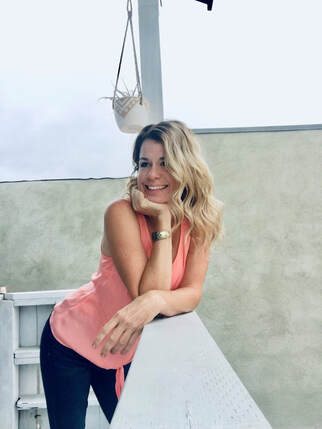Interview with Jennifer Battisti
1. How does writing nonfiction challenge you as a writer?
The challenge I often encounter in writing nonfiction is the most effective way into memory. It's important, I think, to find the best container for retelling a memory, such as particular place or a song, an article of clothing, a photograph to telescope into to tell a broader story. I don't like the restriction of genre, which can be a challenge as well, however, I do think creative nonfiction is evolving to allow for more surrealistic and lyrical approaches, which when done with clarity of intent, still holds the ethics of fact and character.
2. If you had to re-read the same book every day, which work would you choose and why?
What an impossible question! There are many poets I return to again and again. Dorianne Laux, Ellen Bass, Sharon Olds, Frank O'Hara. For nonfiction, On Earth We're Briefly Gorgeous and Mary Karr's The Liars' Club are two of the most inspiring examples of brilliantly raw writing.
3. How do you nourish your creativity?
Experience is the best nourishment for creativity. Writing has changed my perception of the way I look at circumstance. I no longer view the world through a dualistic lens, good/bad right/wrong. I'd rather interesting things happen to me than good things. It all goes towards keeping the well stocked with the human condition. I also find staying in my body helps to foster memory. A poem or an image often comes to me in the middle of a vigorous yoga class. Reading is as important or maybe more than writing is. I know when I am inspired by a writer when I say out loud while reading, "you can do that!?"
The challenge I often encounter in writing nonfiction is the most effective way into memory. It's important, I think, to find the best container for retelling a memory, such as particular place or a song, an article of clothing, a photograph to telescope into to tell a broader story. I don't like the restriction of genre, which can be a challenge as well, however, I do think creative nonfiction is evolving to allow for more surrealistic and lyrical approaches, which when done with clarity of intent, still holds the ethics of fact and character.
2. If you had to re-read the same book every day, which work would you choose and why?
What an impossible question! There are many poets I return to again and again. Dorianne Laux, Ellen Bass, Sharon Olds, Frank O'Hara. For nonfiction, On Earth We're Briefly Gorgeous and Mary Karr's The Liars' Club are two of the most inspiring examples of brilliantly raw writing.
3. How do you nourish your creativity?
Experience is the best nourishment for creativity. Writing has changed my perception of the way I look at circumstance. I no longer view the world through a dualistic lens, good/bad right/wrong. I'd rather interesting things happen to me than good things. It all goes towards keeping the well stocked with the human condition. I also find staying in my body helps to foster memory. A poem or an image often comes to me in the middle of a vigorous yoga class. Reading is as important or maybe more than writing is. I know when I am inspired by a writer when I say out loud while reading, "you can do that!?"
Nonfiction Preview:
The Meadow
The Meadow
We teeter macaroni salad onto paper plates, totter pine needles from our shoes. The easy temperature giddy-ups our antes. I raise you two goldfish crackers, only to crumble at your gutsy call with two pair. In the distance, the strange muscle of curiosity takes shape. Road trip people hashtag the wild into a catchy presumption. We’re all grazing at the sweet blade of the day, taking what we can. Our daughters are three Cheetos, hammock swung, giggling and energized by the endless thrill unfolding from the picnic basket. Out of nowhere— as if we’ve drifted out to sea on gingham, a family of horses surround us. We cannot recognize the landscape. Your son rebuilds a shattered fort. The carpenter ants dip their hats strategically. A gust of wind knocks over the cooler. A wasp changes his mind. The largest horse spells out a message to the others with overturned Scrabble pieces.
Our blanket is foolish; smells of commerce, convenience, Oscar Myer, a disoriented rummy hand, a synthetic springtime lavender that makes the horses buck and neigh. A tabbed soda cracked open spooks the speckled foal. Drunkenly, she discovers the golden retriever beside us, who of course knew this was coming. Nobody speaks. A park ranger does not appear. It’s the dog they want. Hoofed and ready to take him, they corral, nibbling his hindquarters, nuzzling their flanks against his domestication. We freeze and pant. The ants overtake the beet salad, they march through the creases in our summer novels.
The majestic dog is oblivious to the acorn commotion. He watches the children, counts our breaths, is in loyal service to each assembled sandwich, to our saran-wrapped ship floating into the tangled mane. Inside our chests, our hearts gallop. We are so furless and wagoned down with necessity. How could we stop it? He’ll send for his frisbee, an old shoe, pictures of the children. We pack up the van to return to the material world. The horses stand watch outside a makeshift teepee in the woods. Inside, the good dog sleeps. His worldly name falls away. He saddles the feral unknown as fiercely as any of us wish we could.
Jennifer Battisti is a Las Vegas native. She won "Best Local Writer" by readers of Desert Companion (2019). Her chapbook, Echo Bay, was released in 2018 (Tolsun Books). Her work has appeared in or is forthcoming from Manzano Mountain Review, Thin Air Magazine, Coe Review, and The Briar Cliff Review.
